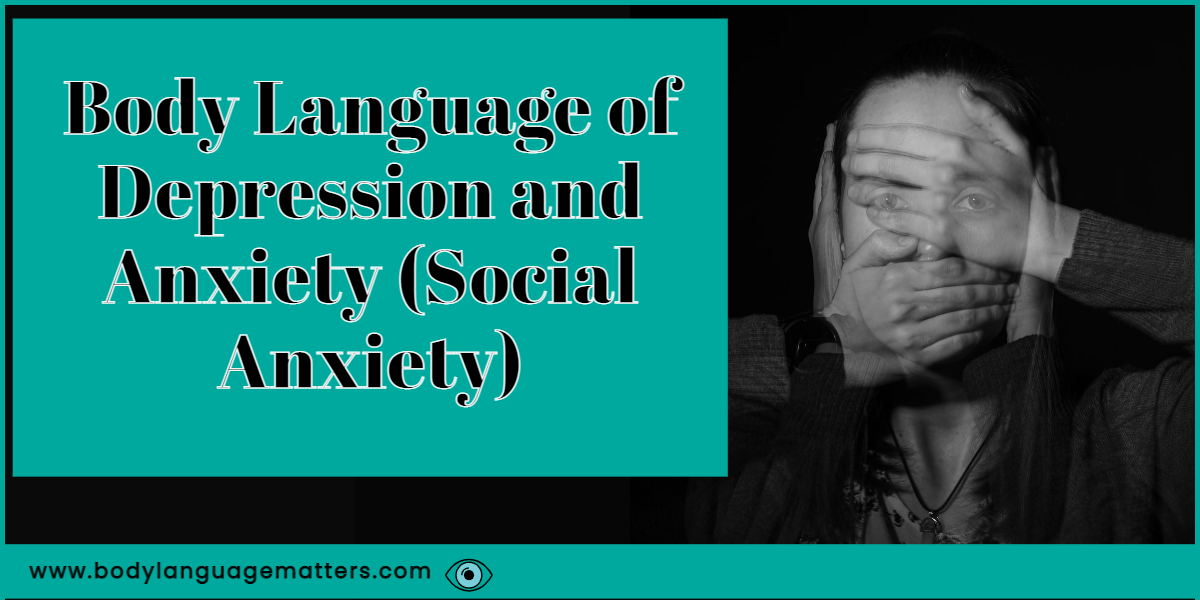Body language is a form of nonverbal communication. It includes facial expressions, body posture, gestures, eye movement, touch, and the use of space.
People who are depressed or anxious may exhibit certain types of body language. For example, they may have a slumped posture, avoid eye contact, and fidget or pace. Their faces may look tense or sad.
Some people with social anxiety may try to avoid drawing attention to themselves by keeping their bodies small. They may keep their heads down, avoid eye contact and not speak up in groups.
Body language is just one way that people communicate. It’s important to remember that not everyone communicates in the same way. Just because someone has a certain type of body language doesn’t necessarily mean they are depressed or
“Remember that there are no absolutes when you are analyzing body language.”
- What is body language?
- What is context in body language?
- How can we spot depressed people with their body language? (Body Posture)
- 9 Ways Our Body Lanague Can Make Us Look Depressed
- What do slumped shoulders look like in body language?
- What does avoiding eye contact mean in body language of a depressed person?
- What does fidgeting mean in a depressed person?
- What does crossing arms mean in body language with anxiety?
- Why don’t depressed people not speak much?
- Why do people with anxiety clutch something for comfort?
- Why do people with anxiety tremble?
- Why do people with anxiety sweat a lot?
- Why do people with depression or anxiety look away a lot?
- Body Language Can Help A depressed person – But How?
- How can we help someone with depressed body language?
- How are depression and anxiety related?
- Final Thoughts.
What is body language?
Body language is a form of nonverbal communication in which physical behaviors, such as gestures, facial expressions, and postures, are used to convey messages. It can be used to communicate emotions, intentions, or feelings, and can be helpful in conveying messages when verbal communication is not possible or desirable. It is said that 60% of our communication is nonverbal so its really important to get it right.
They say that 60% of communication is nonverbal, so it’s really important to get it right.
What is context in body language?
The context in body language refers to the situation or environment in which a person is communicating. It can include factors such as the physical setting, the relationship between the people involved, and the cultural context. All of these factors can influence the way a person communicates through body language.
To understand context, it is best to think about the person’s environment, who they are with, the conversation topic, and the objective.
How can we spot depressed people with their body language? (Body Posture)
There are a few things to look for when trying to spot a depressed person by their body language. They may have their head down, avoid eye contact, and have slumped shoulders. Their body may be tense and they may fidget a lot. They may also pace back and forth or sit in one spot for long periods of time. We will investigate the most prevalent nonverbal signals next.
9 Ways Our Body Language Can Make Us Look Depressed.
- Slumped shoulders.
- Avoiding eye contact.
- Fidgeting.
- Crossing arms.
- Not speaking.
- Clutching something for comfort.
- Trembling.
- Sweating.
- Looking away.
What do slumped shoulders look like in body language?
Slumped shoulders can be a sign of sadness, fatigue, or defeat. They can also indicate that a person is not interested in what is happening around them.
What does avoiding eye contact mean in body language of a depressed person?
Avoiding eye contact means in body language of a depressed person that they are not interested in engaging with the outside world. They may be feeling shy, anxious, or fearful and want to avoid any potential confrontations or interactions. Additionally, they may simply be lost in their own thoughts and not pay attention to their surroundings. Whatever the reason, avoiding eye contact is a common sign of depression.
What does fidgeting mean in a depressed person?
A person who is fidgeting may be experiencing depression. This is because people who are depressed often have trouble sitting still and may feel restless. Fidgeting can also be a way to release pent-up energy and relieve stress.
What does crossing arms mean in body language with anxiety?
Crossing arms is often a sign of anxiety or discomfort. It can be a way of protecting yourself, or of signaling that the person is not open to others. Crossed arms can also indicate that a person is feeling closed off and disconnected from those around them this is called a barrier in body language terms.
Why don’t depressed people not speak much?
Depressed people may not speak much because they may feel that their problems are not worth talking about, or that no one would understand. They may also be feeling too overwhelmed to talk or be preoccupied with negative thoughts. Additionally, some depressed people may believe that speaking up will make their situation worse. Pay attention if you think someone is suffering from depression.
Why do people with anxiety clutch something for comfort?
There are many reasons why people with anxiety might clutch something for comfort. For some, it may be a way to ground themselves and feel more in control. For others, it may be a way to cope with overwhelming feelings of anxiety or stress.
Clutching something can also be a way to self-soothe and provide some sense of security these are called pacifiers in body language terms. Whatever the reason, it is often helpful for people with anxiety to have something to hold on to when they are feeling anxious.
Why do people with anxiety tremble?
There are many reasons why people with anxiety may tremble. One reason may be that they are experiencing a high level of stress and their body is reacting accordingly. Another reason may be that they have a medical condition known as essential tremor, which causes involuntary shaking.
Why do people with anxiety sweat a lot?
Anxiety can cause an increase in body temperature, which can lead to sweating. Secondly, when we are anxious, our sympathetic nervous system is activated, which can also lead to sweating. Finally, people with anxiety often have a heightened sense of awareness of their body and its reactions, which can make them more aware of sweating.
Why do people with depression or anxiety look away a lot?
People with depression or anxiety may look away a lot. It could be that they are trying to avoid eye contact because they feel self-conscious or embarrassed. It could also be that they are trying to avoid triggers that might make their symptoms worse. Looking away may also be a way of coping with overwhelming emotions or a way of disconnecting from the world.
Body Language Can Help A depressed person – But How?
Body language can help a depressed person in several ways. First, by making them feel more comfortable in their own skin and less self-conscious.
Second, by helping them to express themselves non-verbally and to communicate with others without having to rely on words.
Third, by providing a physical outlet for their emotions and helping to release tension and stress.
Finally, by increasing their self-awareness and helping them to understand their own feelings and emotions better.
How can we help someone with depressed body language?
There are many ways to help someone who may be experiencing depression. One way is to be aware of their body language. People who are depressed may have a negative or slouched posture, avoid eye contact, and have a generally uninterested appearance. If you notice someone exhibiting these behaviors, approach them and ask if they are okay. Let them know that you are there for them and offer any support that you can provide.
We recommend that you consult with mental health experts before offering any other advice to those suffering from depression. Below is a list of 13 mental health charities that can help.
How are depression and anxiety related?
Depression and anxiety are related in that they are both mental health conditions that can cause similar symptoms. Both conditions can cause feelings of sadness, low energy, difficulty concentrating, and sleep problems. Anxiety can also cause symptoms of restlessness, irritability, and muscle tension. Depression is more likely to cause feelings of Worthlessness and hopelessness. You may also like to read about Imposter Syndrome Def (Don’t be held back by self-doubt!)
Final Thoughts.
When it comes to body language related to depression and anxiety, there are many ways to spot this. It is important to remember that there are no absolutes in reading body language and no one cue means any one thing for sure. It is always important to read in clusters or shifts of behavior. To find out more about reading body language we recommend you check out How To Read Body Language & Nonverbal Cues (The Correct Way) until next time thanks for taking the time to read this post we hope you’ve found it helpful.

